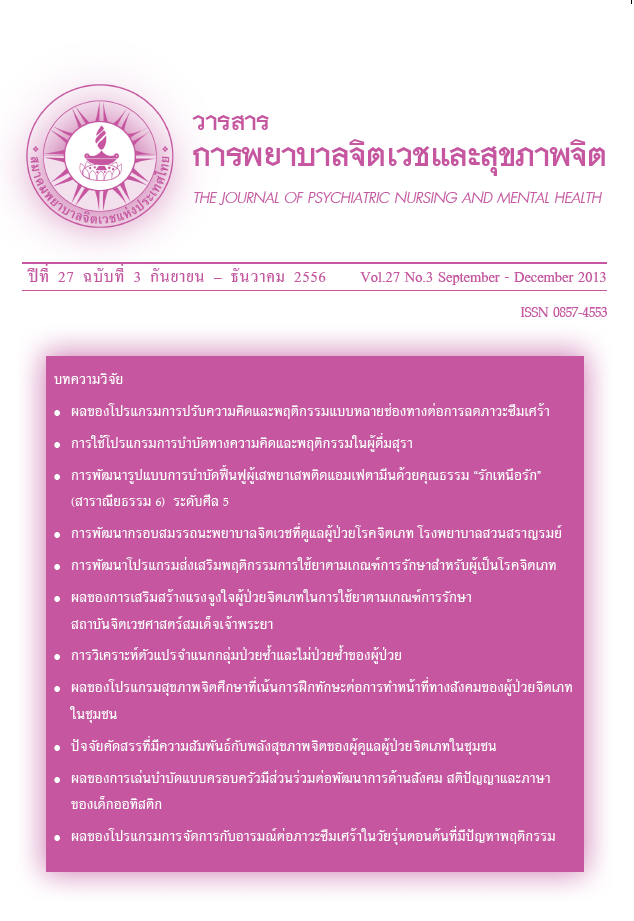การใช้โปรแกรมการบำบัดทางความคิดและพฤติกรรมในผู้ดื่มสุรา
Main Article Content
บทคัดย่อ
บทคัดย่อ
การศึกษานี้มีวัตถุประสงค์เพื่อศึกษาผลและความเป็นไปได้ของการใช้โปรแกรมการบำบัดทางความคิดและพฤติกรรมในผู้ดื่มสุราในชุมชน โปรแกรมที่ใช้ในการศึกษาครั้งนี้ ดัดแปลงจากโปรแกรมการบำบัดทางความคิดและพฤติกรรมในผู้ดื่มสุราที่สร้างโดย ดรุณี ภู่ขาว (2545) กลุ่มตัวอย่างที่ใช้ในการศึกษาครั้งนี้เป็นสมาชิกในชุมชน ที่มีพฤติกรรมการดื่มสุราแบบมีปัญหาและแบบเสี่ยง จำนวน 9 ราย ผลการศึกษาพบว่าหลังสิ้นสุดโปรแกรม 4 สัปดาห์ ค่าเฉลี่ยปริมาณการดื่มสุราของผู้เข้าร่วมการศึกษา น้อยกว่าค่าเฉลี่ยปริมาณการดื่มสุราก่อนเข้าร่วมโปรแกรมอย่างมีนัยสำคัญทางสถิติ โดยที่ก่อนเข้าร่วมโปรแกรมค่าเฉลี่ยปริมาณการดื่มสุราเท่ากับ 63.56 ดริ้ง/เดือน และหลังสิ้นสุดโปรแกรมค่าเฉลี่ยปริมาณการดื่มสุราเท่ากับ 6.44 ดริ้ง/ เดือน (3 ราย สามารถหยุดดื่มและ 6 รายสามารถลดปริมาณการดื่ม) และพบว่าโปรแกรมมีความเหมาะสมทั้งด้านเนื้อหา สื่อการสอน และระยะเวลา ผู้เข้าร่วมการศึกษามีความพึงพอใจ และมีความคิดเห็นว่าสามารถนำไปใช้ประโยชน์ต่อตนเองได้ จากผลการศึกษาครั้งนี้ แสดงให้เห็นว่าโปรแกรมการบำบัดทางความคิดและพฤติกรรมนี้มีความเป็นไปได้ในการนำไปบำบัดผู้ดื่มสุราในชุมชน อย่างไรก็ดีการจะนำโปรแกรมไปใช้นั้นต้องดัดแปลงให้เหมาะสมกับบริบทของแต่ละชุมชน
Abstract
The present study aimed at investigating the effects and the appropriateness of a cognitive behavior therapy program for alcohol consumers in the community. The program used in this study was adapted from the program developed by Darunee Phukao (B.E. 2545). The participants of the study were nine community members who had risky or harmful drinking behaviors. The study findings revealed that at four weeks after the end of the program, the mean quantity of alcohol drinking of the study participants was lower than that measured before the implementation of the program with statistical significance. Before participation in the program, the mean quantity of alcohol consumption was equal to 63.56 drinks/ month, but after the participation in the program, the mean quantity of alcohol consumption decreased to 6.44 drinks/ month, with three participants being able to quit drinking and six being able to reduce the amount of alcohol consumption. It was also found that the cognitive behavior therapy program for alcohol consumers was appropriate in terms of contents, teaching materials, and program duration. In addition, the study participants were satisfied with the program and believed that the program could be implemented to benefit themselves after this. Based on the findings of the study, it could be concluded that the cognitive behavior therapy program for alcohol consumers was appropriate for implementation with alcohol consumers who live in the community. However, before each implementation, the program should be applied to suit the specific context of the community to ensure its effectiveness.Article Details
ประเภทบทความ
บทความวิจัย
บทความที่ได้รับการตีพิมพ์แล้ว เป็นลิขสิทธิ์ของสมาคมพยาบาลจิตเวชแห่งประเทศไทย


